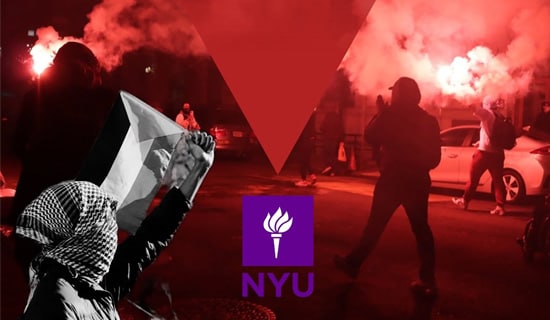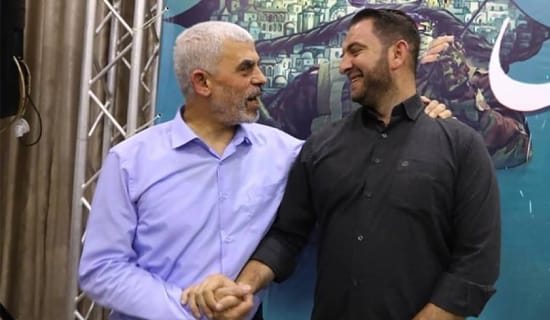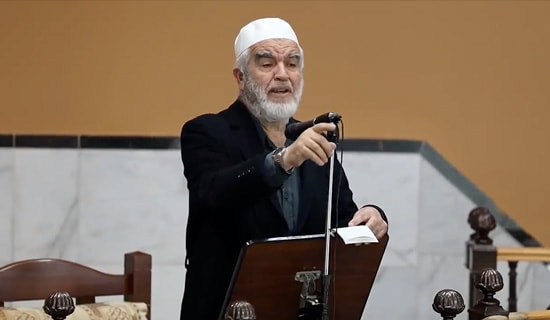The Saudi royal visit to Russia concluded on October 8. One of King Salman's main goals during his visit to Moscow was to convince Russia not to place "all its cards in the region on Iran."[1] On October 5, 2017, Saudi King Salman met with Russian President Vladimir Putin.[2] On that occasion, the Saudi monarch stressed the importance of stability in the Persian Gulf as an essential pre-requisite for achieving security and stability in the world. King Salman added: "This requires that Iran abandon attempts to interfere in the domestic affairs of the states in the region and stop the activity that destabilizes the region."[3]
On October 6, during his meeting with Russian PM Dmitry Medvedev, King Salman reiterated his position towards Iran. The Saudi monarch told Medvedev: "[Earlier with the Russian President] we also discussed the necessity to reach peace and stability in the Middle East region. In order to do that, Iran has to stop its policy, maintain good neighborly relations and respect international legality."[4]
The royal visit was also an opportunity for Saudi and Russian companies to sign business deals. Nezavisimaya Gazeta reported that over a dozen deals were signed, in the fields of defense, communications, space, trade and investment.[5]
Concerning the oil and energy market, Saudi Aramco signed five Memoranda of Understandings (MOUs) with key Russian energy entities during Salman's visit.[6]
As for defense, Saudi Arabia signed a preliminary agreement to buy S-400 air defense systems. The Saudi Press Agency also specified that the Saudi Ministry of Defense signed with Russia contracts for the supply of S-400, Kornet-EM systems, TOS-1A missiles, AGS-30 bombers, Kalashnikov AK-103 assault rifles and their ammunition.[7] It is worth noting that immediately following the S-400 deal, the U.S. government approved the sale to Saudi Arabia of the advanced Terminal High Altitude Area Defense (THAAD) missile defense system for $15 billion.[8]
However, following the news of the S-400 deal, RIA news agency published a comment expressing reservations about a possible sale to Saudi Arabia. An unidentified expert from the Center for Analysis of Word's Arms Trade was quoted, as saying: "Moscow should approach this issue with healthy pragmatism– if Riyadh really wants to purchase those systems [S-400], then let's stamp the agreement with 100% payment in advance and only then they will stand in a line for delivery after we supply the systems to China, Turkey and, as expected, India."[9]
The expert recalled that Russia already had a negative experience of military cooperation with Saudi Arabia. He stated that in the past Saudi Arabia made preliminary agreements to purchase Russian weapons, but the whole thing ended up in nothing concrete. The expert said that the Saudis actually promised to purchase weapons if Russia renounced its intention to supply S-300 systems to Iran. It should be noted that Iran’s Revolutionary Guard Corps recently displayed the S-300 in Tehran on September 24, 2017.[10] The expert then added: "If in fact there are signed agreements regarding building the nuclear plant in Saudi Arabia and there are [Saudi] investments in exploring and producing oil and gas in the Arctic shelf, then the S-400 contract will be a great supplement to this package."[11]
During his stay, King Salman also met with the presidents of the predominantly Muslim republics of Chechnya, Ingushetia, and Tatarstan in Moscow.[12] Saudi Arabia sees itself as the leader of the Sunni world, whereas the Russian hosts may see the meeting as conferring Muslim religious legitimacy upon Moscow.
The following are reactions to the historic visit by Saudi King Salman to Russia:
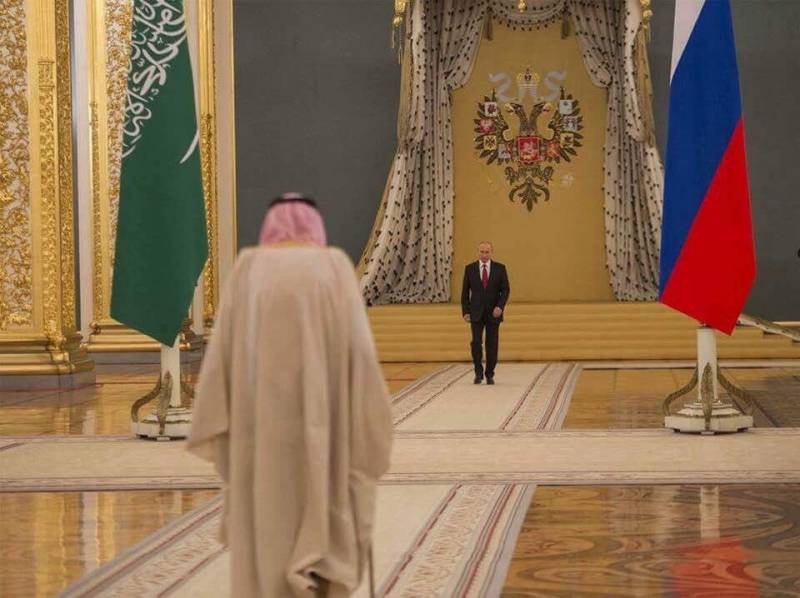
Saudi King Salman meeting with Russian President Vladimir Putin (Source: Topwar.ru)
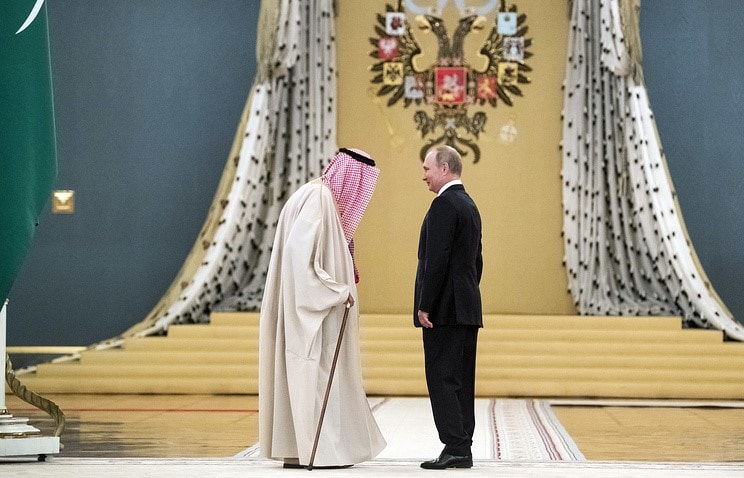
Saudi King Salman and Russian President Vladimir Putin (Source:Tass.com)
RIA Columnist: Saudi Arabia Reached The Conclusion That The U.S. Is No Longer Able To Protect The Kingdom; 'Iranian Interests Are Not A Priority For Russia'
RIA news agency columnist Gevorg Mirzayan penned an article, titled "The Visit To The New Lord Of The Middle East: The Saudi King In Moscow." In the article, Mirzayan stated:
"Despite the fact that the two sides for a long time were considered to be adversaries, Moscow's and Saudi's comments regarding their intention to strengthen their mutual relations prove that both sides decided to leave the emotions behind…
"Part of the Saudi leadership began to endorse the conclusion that the U.S. is no longer able to fulfill the Quincy Pact (struck in 1945 between [President] Roosevelt and the first King of Saudi Arabia Abdulaziz) and protect the Kingdom of the Two Holy [Cities]. For that reason, Ryiadh, according to Prince Mohammad Bin-Salman, would like to hedge the risks….
"The aforementioned risks arose due to a third country – Iran. The Islamic Republic, which is perceived in the Kingdom as an existential threat, has seriously strengthened its presence in the region in the last 15 years… For some time the common opinion of Saudi and Western experts was that no deal is possible with Putin by definition. Russia has been presented as a part of Shiite axis, the experts were convinced that the Kremlin was in the Shiite camp in the Shia-Sunna conflict. Yet, Moscow has demonstrated that this is not the case, and that Iranian interests are not a priority for Russia….
SUPPORT OUR WORK

"The Russian national interest implies creation of balance of interests in the region – only then no power will contemplate ejecting Moscow from the region, but [instead] there will be an attempt to seek Russian support to shift the balance in its favor."
(Ria.ru, October 5, 2017)
Russian Public Intellectual Lukyanov: Saudi Arabia Wants To Diversify Its Allies; Russia Is An Important Player In The ME, Which Influences Saudi Interests
According to the highly respected Russian intellectual Fyodor Lukyanov, editor of Russia in Global Affairs, Saudi Arabia recognized that Russia is an important player in the Middle East, though years ago the Saudi's perception of Russia's actions in Syria was hostile. However, Lukyanov cautions that although Russia-Saudi relations have taken a positive turn, Riyadh remains a traditional American ally. Lukyanov said: "If we compare the set of documents signed today with the 'catch" from Donald Trump's visit to Saudi Arabia a few months back, we get a correct picture. The money that Saudi Arabia is ready to pay for having good relations with the U.S. is ten folds higher than the money Riyadh is momentarily ready to pay for the same kind of relations with Russia."
He recalled that only a couple of years ago the relations were extremely negative, including direct threats to Moscow from Saudi Arabia, following Moscow's stance on Syria.
Lukyanov added: "Now the things have changed, which is a proof that the Saudi Arabia has recognized Russia as a very important player in the Middle East, as a power upon which the Saudi minterests depend on. When a country enters such a category, the classic Saudi diplomacy takes effect, which is based on massive financial expenditures in order to preserve good relations."
He amplified: "Russia asserted its view on Syria. To put it very primitively: Russia has sustained in Syria a military victory over forces, backed – among the others – by Saudi Arabia itself. Thus Russia proved it is a force worth having good relations with and one to be reckoned with…
"We do not suggest ourselves as a replacement for the U.S., since Washington is Riyadh's strategic partner, no one is going to change it. Yet, the U.S. is following quite nervously the strengthening of Russian positions in the Middle East. The strengthening of Russian positions is proved by the fact that traditional U.S. partners are paying greater attention towards Moscow – Saudi Arabia, Israel, Qatar… Yet, it is by no means to be considered as a substitution [for the U.S.], but rather a diversification".
(Ria.ru, October 5, 2017)
RISS Expert Suponina: 'Russia Will Not Give Up On Its Old Partners, Such As Iran'
Elena Suponina, expert in Mideast affairs and advisor to the director of the Russian Institute of Strategic Studies (RISS), commented as follows on the Saudi King's visit: "Hope exists that the political difference of the past won't hinder Moscow and Riyadh from establishing close economic cooperation. The number of the signed documents is impressive. In any case, Russia from its side will do everything in order to implement the agreements and not let them dry out as ink on the paper. Let's hope the Saudi side will approach matters equally pragmatically. "
She further added that it's obvious that the Saudi delegation perceived Russia as an important actor, which has returned to the Middle East, and a consideration of whose interests could not be dispensed with.
Suponina then added: "The most important thing is that pragmatic economic cooperation will develop. For its part, Russia will not renounce its old partners, such as Iran and other countries."
(Ria.ru, October 5, 2017)
Institute Of Oriental Studies Director: 'This Is A Turning Point In Russia's Relations With The Countries Of The Persian Gulf And The Sunni World'
The Director of the Institute of Oriental Studies of the Russian Academy of Sciences Vitaly Naumkin said: "In the eyes of a large part of the Arab population, Russia was perceived as a state that gravitated towards a Shiite minority because it has good relations with Iran and criticizes those who support the Syrian opposition and anti-Assad elements… The fact that the ruler of this country, which is perceived as a symbol of the Sunni world, comes to Moscow is a sign of recognition that Russia is a serious player in the Muslim world."
Naumkin explained that now the Sunni world will change "the understanding" of Russian foreign policy. "The visit will be perceived as evidence that Russia is also ready to adapt its Middle East policy to the needs of its new partners. I think that is also well understood in the Middle East… This is a turning point in Russia's relations with the countries of the Persian Gulf and the Sunni world."
(Tass.com, October 6, 2017)
[1] In an interview with the Washington Post, Muhammad Bin Salman stated that the goal of Riyadh in relation to Moscow is "not to have Russia place all its cards in the region behind Iran." Washingtonpost.com, April 20, 2017.
[2] See MEMRI Special Dispatch No. 7123, Russian-Saudi Relations - Russian Expert: Russia Will Have To Talk To The Saudis From A Position Of Strength, October 6, 2017.
See MEMRI Special Dispatch No. 7122, On Russian-Saudi Relations, Russia's FM Lavrov Says: King Salman's Historic Visit To Russia Will Bring Our Cooperation To A Totally New Level, October 4, 2017.
See MEMRI Special Dispatch No. 7028, Russian Middle East Expert: KSA's Bin Salman A Friend, But A Difficult One>, July 27, 2017.
[3] Kremlin.ru, October 5, 2017.
[4] Ria.ru, October 6, 2017.
[5] Tass.com, October 6, 2017.
[6] See Saudi Arabian and Russian companies can create significant synergy in ensuring sustainable energy future, says Saudi Aramco CEO.
[7] Saudigazette.com.sa, October 7, 2017.
[8] Saudigazette.com.sa, October 7, 2017.
[9] Ria.ru, October 5, 2017.
[10] En.radiofarda.com, September 25, 2017.
[11] Ria.ru, October 5, 2017.
[12] Saudigazette.com.sa, October 7, 2017.


